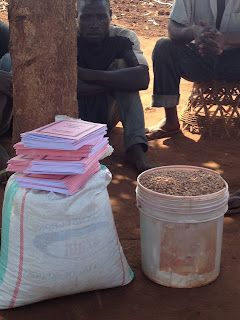During the holidays our friends, the De Kruijffs, came to
Montepuez for a visit. At one point, I
sat on the couch while Arie was teaching one of my daughters how to play
chess. He described how there were three parts to the game. There’s the opening - where you get your
chess pieces in position. The middlegame
- where you work to add pressure and attack weaknesses. And the endgame – where, as multiple pieces
have been removed from the board, the players are able to focus on the main
objective.
But it also struck me that understanding the middlegame is
also extremely important for appreciating what's happening at the macro-level as well. Much of missions training focuses on the
opening game (the incarnational aspects of learning language and culture when
moving to a new context) and the endgame (the goal of missions to cultivate
healthy communities of faith that will continue to grow and flourish), but in
many important ways - where the contest is actually won or lost is in the
middlegame - that messy part where the “ideals” of strategy often give way to
the “reals” of confusion amidst the whirl of regular activity.
Reuben Fine’s book, The Middle Game in Chess
describes the three key elements of the middlegame: force (or material),
mobility (or freedom of movement for the pieces), and King safety (p. 3). These
aspects are not necessarily of equal importance and a major advantage in any
one of them can benefit or strengthen the position of the others.
Here, in the 13th year of my ministry in
Mozambique, it seems that we are somewhere between the middlegame and the
endgame. And as I reflect on our team’s
own “middlegame” season of ministry in Fine’s terms, here are some of the ways
I believe we’ve addressed his three middlegame essentials:
1. Force (or material –
pieces that are equipped to engage the enemy) – I’ve written about the “Giants” here and here. The Giants of Drunkenness,
Magic, Unfaithfulness, Poverty and Ungodly Leadership are the forces that work
to oppress the Makua-Metto people.
Naming them, talking openly about their destructiveness, and teaching on
how to deal with them has been a way to bring them out of the shadows and equip
the church (God’s local mission force) to engage them effectively.
2. Mobility (freedom of
movement for the pieces) – A few years back we had a consultant visit that
helped us see the need to intentionally address how the churches were organized (what they called “Structures of
Continuity”). The leadership structure of
the churches at that time was not arranged in a way that allowed the local
leaders to serve and lead effectively.
They didn’t have the space or mobility to use their gifts well. That recognition and the removal of a toxic leader, liberated us move to a different and very rewarding model of leadership. For more about how the leadership structure among the churches is working, changing, and where it is hopefully heading, see this post.
3. King safety – Making
disciples of Jesus is the great co-mission that we have been called to (Matt.
28). For more on discipling in our context see here, here and here. By making real disciples of the King, the work
is fortified and strengthened in a way that is unassailable to the forces of
Darkness. The safest way to protect the King
in the middlegame of missions is to make as many copies of the King in as
many places as possible.
As I was doing some
research into the idea of the middlegame and missions, though, I came across a quote
that led me to a different line of thinking. Hosen poses a question about how to notice the difference between an endgame and the middlegame? In response he says, “Let's call it, ‘When
the King becomes active.’” Ultimately the point of the middlegame is as a setup
for the endgame… And that’s where my
analogy for missions and the middlegame breaks down. Our King is always active and working towards his endgame throughout every single stage
in our own personal time as a piece on the chessboard. That’s the real, meaningful connection point…
where our middlegames blend into God’s endgame.
May God use our middlegame to bring about His endgame – the
Kingdom of God here on earth as it is in Heaven.
Grace and Peace,
Alan













